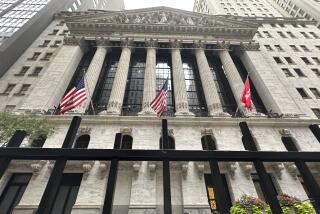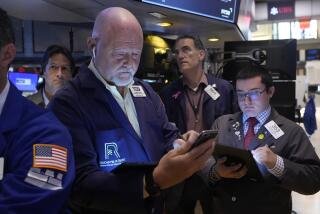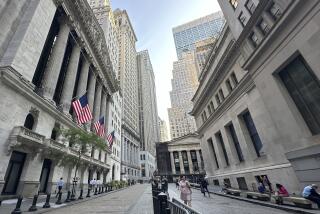Tokyo Stocks Soar as Investors Bring Funds From U.S.
TOKYO — Japanese investors bringing money home from the United States spurred the Tokyo Stock Exchange to a record high Friday for the fourth day in a row. At the same time, a cabinet minister threatened to resign rather than accept an agreement on exchange rates reached by the chief financial officers of seven leading non-Communist countries.
Hajime Tamura, minister of international trade and industry, described as an “insult” Wednesday’s declaration in Washington by the financial officials, which included a pledge by Japan’s Finance Minister Kiichi Miyazawa to open up Japan’s markets.
“The Ministry of International Trade and Industry is doing everything there is to do to open markets,” Tamura said Friday. “If there is anything lacking in our market-opening, the items should be listed one by one. Even if I throw away my job, I cannot countenance this declaration.”
Miyazawa has been widely criticized here for joining the other finance chiefs--representatives of the United States, Britain, West Germany, France, Italy and Canada--in declaring that the value of the dollar and other currencies was now “basically correct,” despite an increase of about 6% in the yen’s value since Feb. 22.
The rare outburst of anger in a cabinet meeting was precipitated by another plunge in the dollar’s relative value, to a record low of 142.50 yen, down 2.90 yen, or 2%.
The Tokyo Stock Market moved in the opposite direction, establishing a new high for a fourth consecutive day. Average prices rose 294.39 yen to close at 23,216.59. Purchasers also drove up prices for Japanese government bonds, so rapidly that trading was stopped when the market’s limit for a single-day gain was reached for the first time since last Oct. 30.
Traders attributed the upward spiral in the stock market to a virtual halt of Japanese purchases of U.S. Treasury bonds.
“Japanese investors have stopped buying U.S. Treasury bonds,” Yo Kurosawa, deputy president of the Japan Industrial Bank, told a group of foreign correspondents. He said Japanese holdings of more than $100 billion in U.S. Treasury bonds has become dangerous.
“I am recommending that (Japanese institutional investors) not buy such a huge amount,” he said. “The better way is to let the U.S. government issue yen bonds in Tokyo.” Kurosawa added that the U.S. Treasury Department apparently has rejected any idea of issuing yen bonds, as was done under the Carter Administration in the late 1970s in a successful dollar-stabilizing maneuver.
Tamura opened his tirade in the cabinet meeting by declaring that the skyrocketing value of the yen, which eats into profits earned by exporters, threatens to destroy smaller enterprises in Japan.
He condemned Prime Minister Yasuhiro Nakasone for failing to make his new economic policy, which was approved Tuesday, specific enough to show the rest of the world that Japan is moving to spur domestic growth.
The prime minister tried to soothe Tamura by pointing out that Japan needs to open markets in sectors not under the Trade Ministry’s control.
More to Read
Inside the business of entertainment
The Wide Shot brings you news, analysis and insights on everything from streaming wars to production — and what it all means for the future.
You may occasionally receive promotional content from the Los Angeles Times.










